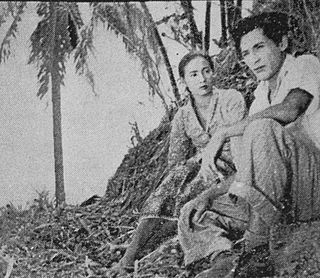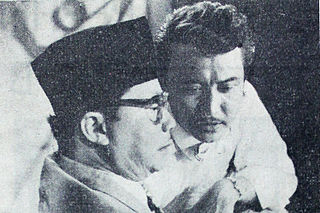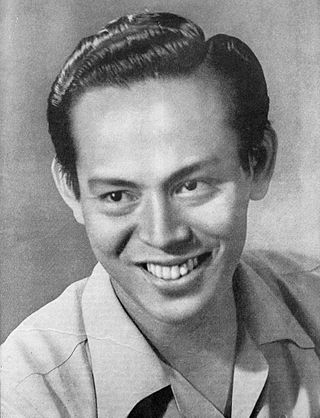
Embun is a 1952 film directed by D. Djajakusuma for Perfini in his directorial debut.

Abisin Abbas, better known by his pseudonym Andjar Asmara, was a dramatist and filmmaker active in the cinema of the Dutch East Indies. Born in Alahan Panjang, West Sumatra, he first worked as a reporter in Batavia. He became a writer for the Padangsche Opera in Padang, where he developed a new, dialogue-centric style, which later spread throughout the region. After returning to Batavia in 1929, he spent over a year as a theatre and film critic. In 1930 he joined the Dardanella touring troupe as a writer. He went to India in an unsuccessful bid to film his stage play Dr Samsi.

Terang Boelan is a 1937 film from the Dutch East Indies. Written by Saeroen, directed by Albert Balink, and starring Rd Mochtar, Roekiah and Eddie T. Effendi, Terang Boelan follows two lovers who elope after one is almost forced to marry an opium smuggler. The film was shot in the Indies and Singapore, and was partially inspired by the 1936 Hollywood film The Jungle Princess. It was aimed at native audiences and included keroncong music, which was popular at the time, and several actors from Balink's previous work Pareh (1936).

Raden Ariffien, often credited as Rd Ariffien, was an Indonesian film director. Initially a nationalist figure, he entered the film industry in 1940 after a period in theatre and radio. During his 25-year career, he was involved in some 36 films in various positions. He later became head editor of the film magazine Varia.
Tjitra is a 1949 Indonesian film directed by Usmar Ismail for the Dutch-owned production house South Pacific. Starring Raden Sukarno, Nila Djuwita, and Raden Ismail, it follows a man named Harsono who takes a woman's virginity then flees to the city, where he is caught up in a murder case. Ismail's directorial debut, Tjitra was made while its director was still a member of the Indonesian Army. He later disavowed the film, as he felt he had had too little creative input.

Gadis Desa is a 1949 comedy from what is now Indonesia written and directed by Andjar Asmara. Starring Basuki Djaelani, Ratna Ruthinah, Ali Joego, and Djauhari Effendi, it follows the romantic hijinks of a village girl who is taken to be a rich man's second wife. The film, produced by a Dutch-run company, is recognised as the first in which future "father of Indonesian film" Usmar Ismail was involved.

Darah dan Doa is a 1950 Indonesian war film directed and produced by Usmar Ismail, telling the story of the Siliwangi Division and its leader Captain Sudarto on a march to West Java. Following Ismail's Dutch-produced Tjitra (1949), Darah dan Doa is often cited as the first 'Indonesian' film, and the film's first day of shooting – 30 March – is celebrated in Indonesia as National Film Day.

Max Tera was an Indonesian cinematographer and editor. He was employed by PERFINI in the 1950s and was a frequent collaborator with director Usmar Ismail.

Enam Djam di Jogja is a 1951 Indonesian film directed by Usmar Ismail. It was the second film to be produced under the PERFINI banner. Detailing the show of force in which the Indonesian republican army retook the capital at Yogyakarta for six hours, the film utilised much of the cast and crew from Ismail's previous work Darah dan Doa (1950). The film was a success in Indonesia and continued to be screened on the state television channel into the 1980s, even after two further films about the event were released.

Air Mata Iboe is a 1941 drama film from the Dutch East Indies directed and written by Njoo Cheong Seng. Starring Fifi Young, Rd Ismail, Ali Sarosa, and Ali Joego, it followed a mother who raises her children lovingly but is ultimately betrayed by her eldest sons when she falls upon hard times. The film, billed as a "musical extravaganza," featured a soundtrack by R. Koesbini, and an eponymous title song written by Njoo.

Panggilan Darah is a 1941 film from the Dutch East Indies written and directed by Sutan Usman Karim and produced by Tjho Seng Han for Oriental Film. The black-and-white film starred Dhalia and Soerip as orphaned sisters trying to make a living in the colonial capital of Batavia before moving to Kudus to work at a clove cigarette factory.
Noesa Penida is a 1941 film from the Dutch East Indies which was directed by Andjar Asmara and produced by The Teng Chun of Java Industrial Film. It tells of a love triangle between two brothers, born to a commoner, and a noble woman.
Djaoeh Dimata is a 1948 film from what is now Indonesia written and directed by Andjar Asmara for the South Pacific Film Corporation (SPFC). Starring Ratna Asmara and Ali Joego, it follows a woman who moves to Jakarta to find work after her husband is blinded in an accident. SPFC's first production, Djaoeh Dimata took two to three months to film and cost almost 130,000 gulden.

Air Mata Mengalir di Tjitarum is a 1948 film from what is now Indonesia, written and directed by Roestam Sutan Palindih for the Tan & Wong Bros Film Company.

Tamu Agung is a 1955 Indonesian dramatic comedy film directed by Usmar Ismail. It stars Cassin Abbas, Nina Amora, M. Pandji Anom, and Chitra Dewi. The satirical political comedy, about the anticipation of the visit of a dignitary to a small isolated village in East Java, was critically acclaimed, although it was disliked by the government. The film, produced under the Perfini banner, was shot by cinematographer Max Tera. This movie is set in the modern day.

Star Film was a film production company in the Dutch East Indies. Established by Chinese-Indonesian businessman Jo Eng Sek and Chinese cameraman Cho' Chin Hsin in 1940, it produced five black-and-white films in 1940 and 1941; two of these were directed by Jo, and the remainder were directed by Wu Tsun. Another film was under production when the studio was closed following the Japanese occupation of the Dutch East Indies. Star helped establish the careers of actors such as S Waldy and Elly Joenara, and produced screenplays written by Rd Ariffien and Saeroen; its output, however, is probably lost.

Raden Soekarno, better known as Rendra Karno, was an Indonesian actor. Born in Kutoarjo, Central Java, Soekarno entered the film industry in 1941, making his debut appearance in Union Films' Soeara Berbisa. Over the next forty years he appeared in more than fifty films. He was also involved in the theatre during the Japanese occupation of the Dutch East Indies and the Indonesian National Revolution. For his role in 1962's Bajangan di Waktu Fadjar, he was named best supporting actor at the 1963 Asian Film Festival in Tokyo.

Abdul Hamid Arief was an Indonesian actor who appeared in more than 120 films. Born in Batavia, Dutch East Indies, he started his acting career in theatre before migrating to film with 1948's Anggrek Bulan. His first starring role, and the one from which he first gained recognition, was as the title character in Pangeran Hamid. Over subsequent decades he was a productive film actor, often appearing in four or five films a year. He also acted in various television series.
















